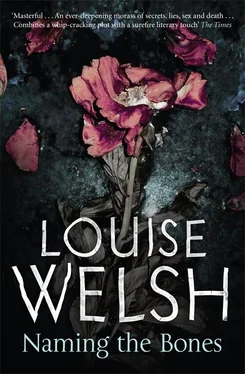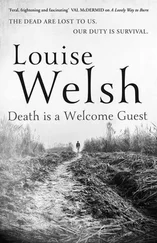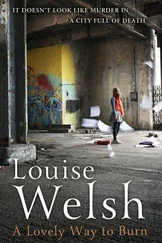Murray felt like hurling his phone across the expanse of wind and dark. He’d lost control of the interview again, the old man turning it back to poetry, the work, not the life.
‘I’m not sure I’ll have the time. I need to concentrate my researches on Lunan and his circle.’
‘Fergus was part of his circle.’ The voice grew softer in his ear, becoming one with the wind and trembling grass. ‘Indulge me. Remember, I used to be a professor of English literature, I do know of what I speak.’
‘Once a professor, always a professor.’
‘They could put that on my gravestone.’ James grew serious. ‘Remember, Dr Watson. Some people never essentially change. In my opinion, Fergus Baine is one of them. Think of how he is now and that will tell you pretty much how he was back when Lunan and he were friends — and they were friends, whatever smoke Baine has tried to blow in your eyes.’
‘Will you tell me what the two of you fell out about?’
‘I can’t. It affects someone else, someone blameless. What I will say is that Fergus Baine was a prodigy of mine who abused his position. His move down south in 1978 wasn’t entirely voluntary. I gave him a reference for a post in England to get him out of the way, but if I had any power he wouldn’t be back in Scotland, working at my old university, and certainly not in the capacity he occupies.’
‘Where would he be?’
‘In Hell.’ The old man laughed. ‘Or still in the south of England. Tell me where you’re staying and I’ll ask Iris to send you a copy of his poetry tomorrow by first-class post. I promise you’ll find it interesting.’
Murray gave him the address of the B&B, as far as he remembered it, then said, ‘It was Bobby Robb that I really wanted to find out about.’
‘Bobby Robb was an ignorant fool.’
‘What makes you say that? The way he looked? Talked?’
‘Certainly not the way he looked, though God knows he looked like an idiot, but then most of them did. Long hair and beards, dressed like Gypsy Rose Lee strung about with bells and cockle shells. No, Bobby Robb was a mess, but he wasn’t the worst. It wasn’t the way he talked either. Robb wore his working-class roots on his sleeve, but I’ve met too many intelligent working men and too many idiot toffs to judge a man on his accent. It was Bobby Robb’s preoccupations that declared him stupid. He was interested in what has been rechristened as New Age. Occultism, astrology, all that superstitious nonsense the Elizabethans were fascinated with. Excusable in the sixteen hundreds, but astoundingly brainless in the twentieth century.’
‘Did Archie engage with it too?’
‘Archie could be foolish, but he wasn’t dense. I remember him making fun of Robb, calling him the sorcerer’s apprentice, but I never paid much attention. Back then a lot of people were fascinated by these things, encouraged by drugs, I suppose. They had amazing sensory and quasi-religious experiences that made them begin to think there were existences apart from this one.’
‘You were never tempted to try it for yourself?’
‘Try what?’
‘LSD, acid. A lot of educationalists got into it — turn on, tune in and drop out.’
‘I couldn’t drop out. I told you, my father was an engineer at Barr & Strouds, I had a good Presbyterian upbringing and a family to support. No, I was never tempted. I’m what they used to call a square — like you, Dr Watson. Anyway, I find the world we inhabit rather impressive. I also believe it’s the only one open to us. Why be in a rush to leave?’
Murray fell twice on the way down the hill, but the going wasn’t so bad once he reached the road. The moon was a wisp of itself, veiled by the same clouds that hid the stars. He used the light on his phone as a torch for a while, but then the notion that his progress might be monitored for miles around began to bother him, and so he pocketed it and let his eyes adjust to the gloom. The little house he had noticed on his journey out was in darkness now, the toy tractor still upturned in its garden. The rain came on as Murray had known it would. He kept his head down against the spray and upped his pace, not wanting one of the inhabitants to look out and be frightened by the sight of a stranger walking by so late, on such an inhospitable night.
Helen Trend had been palpably anxious about what her father might say. Her hate for Fergus Baine seemed to outstrip even the professor’s. Murray couldn’t imagine James taking departmental disputes home to share with his children over the dinner table. He weighed up a list of his academic contacts, hoping to identify someone who might know the manner of Fergus’s disgrace, thought about asking Rachel, and rejected the idea almost as it occurred.
The wind seemed to attack him from all sides, the rain swirling around him, blowing into his face, clouding his vision. Murray took his glasses off and wiped them, though he knew it was a useless gesture. He remembered Cressida smiling as she asked if he minded, her orange dress flaring as she’d cleaned his lenses, all the better to view Jack’s exhibition.
He thought about the Pictish men, or whoever they were, who had built the broch, imagined them tucked safe within its bounds, huddled together with their dogs and their livestock. They would have had more sense than to trudge through the dark and the wet. He wondered if Lunan had ever walked these paths at night, muddy and drenched to the skin, asking himself what the hell was going on.
MURRAY TOOK CHRISTIE’S first novel, Sacrifice , down to the dining room with him. He saw the landlady’s eyes on it as she placed his cooked breakfast on the table. Murray set the book aside, making a conscious effort not to rub his hands together with the joy of fried bacon, eggs and sausage materialising before him with no effort from himself.
‘That looks great.’
Mrs Dunn acknowledged his thanks with a nod. She went back into the kitchen, stepping neatly round a cat that had stationed itself in front of the electric heater glowing from the centre of the room, and returned with a pot of coffee and a round of toast.
‘There’s strawberry jam too. I made it myself, with strawberries from the garden.’
Murray was vaguely nervous of home-made produce, but he smiled and said, ‘That’ll be a treat.’ He shifted the book a little to make more space and nodded at the photo on the back cover. ‘I understand she’s a local.’
‘She lives here, yes.’
The woman put the jar of jam on the table and he started to slather his toast with it, hoping she’d kept the cat from the kitchen when she was making it.
‘What’s she like?’
Mrs Dunn was wearing a serviceable skirt topped by a blue jersey that might have been homemade a long time ago, or recently culled from a jumble sale. Protecting the ensemble was a pinny decorated with a map of the cathedrals of Scotland; Aberdeen and Fort William sanctifying her breasts, Glasgow her crotch. The old lady looked like the BBC drama department’s concept of an ideal Scottish housekeeper; Janet to his Dr Finlay. She stared at the book as if she’d never seen it before, her face unreadable.
‘She’s a little different from her photograph.’
Murray looked at the familiar airbrushed image. A soft, doe-eyed face framed by curtains of long hair, Christie in her twenties. The picture bore no relation to the ravaged woman he’d seen at Robb’s funeral.
‘I guess it was taken a while ago.’
The landlady laughed.
‘Before the flood.’
Murray poured himself a mug of coffee, relieved to see her smiling again
‘Are you not having one yourself?’
‘No, I’ll get mine after, once I’ve done the dishes.’ She must have realised he disliked the idea of her cleaning up after him because she added, ‘Don’t worry, I’ve got a machine.’
Читать дальше












